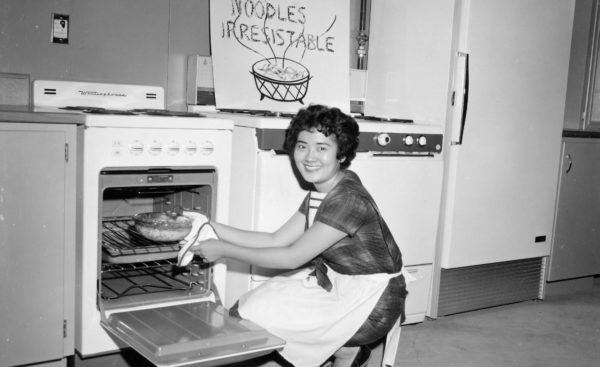

The Elections Committee submits this final slate of Candidates for the 2024 Board Election for the consideration of AMIA Members. All candidates are running for two-year terms.
All members will receive their ballot information via email. Your ballot will include voting for three Board members, a Secretary of the Board, and a Treasurer of the Board.
The 2024 AMIA Board and Officers Election closes on October 17, 2024 at 5:00pm (Pacific). Ballot information, including log in and password information, was emailed to all eligible members. If you wish to request a paper ballot, please contact the AMIA Office and one will be sent. Paper ballots must be received no later than October 17, 2024 at 5:00pm (Pacific).
All votes are anonymous and only the final election results are tallied. The ballot will require a 25% quorum to be valid, or 182 of 725 eligible votes.
The Ballot will close October 17, 2024 at 5:00pm (Pacific).
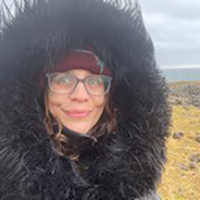 Kelly Haydon
Kelly HaydonGoals. As a prospective candidate for the AMIA board, I am honored by the nomination. I would approach my role with a collaborative spirit, working closely with current members while respecting the contributions of those who have served before me. My background as a technologist, educator, and community archivist equips me to understand the challenges faced by new and undersupported professionals. I am committed to advancing the AMIA Pathways Fellowship and other initiatives that promote diversity, accessibility, and inclusion in our field.
I bring the perspective of a disabled person with profound hearing loss. While I have benefited from accessibility policies, I have also encountered the resource challenges that archivists face. AMIA committees and conferences have made significant strides in addressing these needs. On the board, I would continue to advocate for accessibility policies and explore additional resources or support that AMIA can provide to ensure all members and guests fully benefit from our offerings. Looking ahead, I aim to foster discussion on the growing role of AI in our work. Open AI tools have the potential to expand our capabilities exponentially, but they also present ethical concerns, including labor impacts, environmental costs, privacy issues, intellectual property, and the risk of reinforcing colonialist biases. As AI discussions in the archive field intensify, I want to navigate these complexities thoughtfully, ensuring our work remains inclusive and equitable. If elected, I would approach this role with a collegial attitude, eager to collaborate with the board and work together to achieve our shared goals. Thank you for considering me as a candidate.
Relevant Experience. In my current role as Media Archivist at Human Rights Watch, I oversee the stewardship and security of evidentiary material. I utilize open-source command line tools and AI technology to streamline process automation. My career spans roles such as preservationist, technologist, educator, administrator, and community archivist, primarily in the non-profit sector. Since earning my degree from NYU’s Moving Image Archiving and Preservation program in 2014, I have focused on preserving content on magnetic media, including roles as a digitization technician and preservation manager at Bay Area Video Coalition (now BAVC Media Labs). I have also served as Audiovisual Archivist at NYU Special Collections and managed a CLIR Digitizing Hidden Collections grant at CUNY-TV. I was a core member of the XFR Collective and have presented on preservation and digitization at AMIA, SAA, IASA, the Smithsonian, Korea Film Archive, University of Ghana, and No Time to Wait.
 Michael Marlatt
Michael MarlattGoals. AMIA runs heavily on the work of its staff and volunteers. My number one goal for being on the AMIA Board would be for the continued support for these hardworking individuals. All of my work comes from a person-centered approach of care and empathy. AMIA’s success also comes from sound financial management of allocated resources and funding. I would continue to support AMIA’s current funding partnerships while exploring additional avenues for financial growth. I would take what I have learned about accessibility gaps in the field through my lived experience and education to help create a more accessible AMIA. This applies to programming, committees, membership, sponsorship and partners. AMIA can support archivist mental health initiatives through its community, outreach, and resources. I support the continued growth of the AMIA Pathways Fellowship, Mentorship program, and Education Committee. I am someone who advocates for socially aware education and training for students and early career professionals. I bring the perspective of someone from outside of the US. There is room for AMIA membership to grow internationally. Collaboration is key. As a board member I would strive to foster new relationships, open dialogue, and continued support with community archives, non-profits, and education. AMIA has the opportunity to not only diversify its membership but also act as a major influence field wide. The AMIA Salary & Demographic survey alludes to the work that needs to be done. Thank you all for your consideration!
Relevant Experience. I am a film archivist, archival producer, and archival accessibility advocate. I host workshops that focus on archival accessibility strategies. I have worked on projects for TIFF, the Canadian Filmmakers Distribution Centre, FWD-DOC, the Disability Screen Office, and Archive/Counter-Archive. I have also worked in people-centered management positions for TIFF and the Luminato Festival. I graduated with my PhD in the Communication and Culture program at York University. My dissertation examined accessibility gaps in moving image archival education. I also graduated from TMU’s (then Ryerson University) Film & Photography Preservation and Collections Management program. My experience with AMIA includes serving on the Advocacy Committee, AMIA Pathways Fellowship Taskforce, and co-founding the AMIA Accessibility Committee. I have written for The Moving Image and am guest editing an upcoming issue on accessibility. I have also served on the Professional Development Committee for the Association of Canadian Archivists for nearly three years.
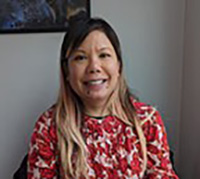 Anna Lynn Martino
Anna Lynn MartinoGoals. My name is Anna Lynn Martino. I am running for a position on the Board of Directors for AMIA. With the current state of the media landscape, where studios are being shuttered, websites are disappearing, and studios are removing content from streaming platforms, it is more important than ever to have an organization that advocates for the preservation and access of moving image media and related materials. As a Board Member, I would continue the goals set forth by AMIA in promoting the role of archivists and librarians as a profession, the importance of the accessibility and preservation of moving images in a variety of institutions and overseeing the growth and sustainability of the AMIA organization. During my career, where I worked in public libraries, school libraries and archives, the roles we play are ever evolving. I have witnessed and participated in the shift from physical to digital materials and our titles changing from librarian or archivist to digital asset manager. As a Board member, I want to bridge the gap that I see across those fields. I would also want to develop relationships across other businesses that would be able to sponsor scholarships and events like with various companies like Adobe or OpenText that have digital asset management systems, but do not participate in archival conferences. It would expand AMIA’s outreach and also represent the changes in our field.
Relevant experience. I am honored to be nominated for a position on the AMIA Board of Directors. I have over 20 years’ experience and, currently, I am the Director of the Nickelodeon Animation Asset Library & Archive. In 2022 wanting to participate at the annual conference, I collaborated with Melissa Woods and Liz Borges-Herzog on a panel discussion on archival practices for animation. The welcoming turnout reflected the openness and interest of the AMIA community. From 2021-24, I served as co-chair in Society of CA Archivists Communications and Outreach Committee, where I was the liaison between the Director of SCA, Communications, the Newsletter Committee and Advocacy committees. In 2020-21, I served as a Board Member for the Burbank Public Library, where we helped advocate for a new Central Library and worked closely with the Burbank City Council to advocate for funding and provided input with the architectural firms bidding for the contact.
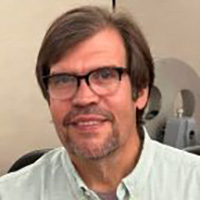 Mike Mashon
Mike MashonGoals. In my two years on the AMIA Board I have been struck by the remarkable energy of this organization, which is due, of course, to its unfailingly generous and thoughtful members. It’s been a joy to work with various committees and task forces, to be involved with online programs, and to meet so many new members who bring an irresistible vitality to AMIA. I am especially proud of the Pathways Fellowship and Mentorship Program and the work of our colleagues to grow and nurture these transformative initiatives. Still, we have challenges, foremost among them fiscal sustainability. Should I be honored with re-election, pursuing sources of external funding will be my primary focus. The AMIA Board is already fully engaged in outreach to potential funders, and I am eager to continue that work. It is abundantly clear from surveys and anecdotal evidence that membership and conference costs are barriers for some people. We offer some travel grants, but not nearly enough. We could make the conference more of a hybrid model, but that takes money. Much time is devoted to locating the conference, trying to find a balance between accessibility and price. We see gratifying engagement with our webinar series and should expand those, but again, need more funding. With a more solid fiscal foundation, we can improve AMIA’s already impressive member resources, open the conference to more attendees be they in person or virtual, engage in more advocacy, support more initiatives, and, crucially, increase the diversity of our membership.
Relevant experience. Until I retired in June 2023, I was privileged to lead the Library of Congress Moving Image Section; prior to my nearly eighteen years in that position, I was Moving Image Curator for seven years. Mine has been a circuitous journey into moving image archiving and preservation, having begun my professional career as an immunologist. I hold an M.A. in Radio-Television-Film from the University of Texas and a Ph.D in the same area of study from the University of Maryland, where I was also Curator of the Library of American Broadcasting for four years before joining the Library. In addition to being a current AMIA Board member, I am also on the boards of the San Francisco Silent Film Festival and IndieCollect.
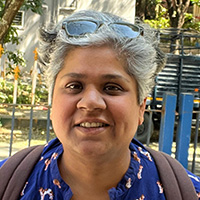 Aparna Subramanian
Aparna SubramanianGoals. I believe in proactively addressing the evolving demands to create impact in our field rather than reacting to them. Looking ahead, key aspects for AMIA’s growth, transformation and sustainability, while remaining mindful of the demands of our time, are:
We can enhance AMIA’s impact by embracing transformation, fostering inclusivity, and better serve its members and the broader communities we engage in.
Relevant experience. I have often been one of the few or only persons of color and/or qualified archivists in various professional settings. Therefore, I recognize the difficulties involved in building a career in archives, particularly when the path forward may seem unclear, regardless of one’s background. I joined AMIA as a student in 2019 and have served for two-years in the Mentorship Advisory Group for Pathways program. Being accessible to new/emerging professionals is a priority, and I have guided and supported individuals in their archival careers, especially those from beyond North America. With 15-years of work experience in archival projects across India & USA, I have received recognition through a Fulbright Fellowship and other awards. I focus on addressing and integrating gaps at the intersection of policies, practices, and education in media preservation. I currently work at the Film & Television Institute of India, offering my expertise and advisory to the institution.
 Kimberly Tarr
Kimberly TarrGoals. If given the opportunity to serve on the AMIA Board, my goals would be to amplify the essential committee work through promotion and publication, strengthen the relationship between AMIA and its student chapters, and support the development efforts to ensure the long-term success of the Association. As a 2009 AMIA scholarship recipient, I know firsthand how important it is for us to continue to support those embarking on careers in this field. One activity to help bridge the gap between those newly joining the field and those who have attended a decade-plus of AMIA conferences would be reinstating the Newcomers’ Mixer conference. Helping to bridge a perceived divide between those working with analog media and those focused on digital collections is a goal, as I have seen and experienced the field’s evolution over the past two decades. Past conference content is now being made available to members; I’d like to strategize tailoring the promotion of such presentations and webinars to link with current events and Association priorities. Education, training, and professional development are vital elements of AMIA’s work, and I would welcome the chance to use my experience as an educator to support these initiatives. In managing the media preservation program at NYU Libraries for over a decade, I learned the challenges and opportunities of caring for audiovisual materials. That hands-on experience made me consider activities beyond reformatting that bookend digitization, including conservation, arrangement and description, captioning, publication, and contextualization.
Relevant Experience. Since day one, the Association has supported my education and training in this field. Just weeks after starting graduate school, I flew to Rochester, NY, to attend my first AMIA conference. At that event, I connected with students from other academic institutions and colleagues from around the globe–many of whom I keep on speed-dial to puzzle out solutions to thorny AV issues. I have remained closely connected to the Association’s goals and activities through conference presentations, coordinating the pilot Online Continuing Education webinars (and later serving on the Continuing Education Task Force), supporting the mentorship program, and collaborating on various committees. As the Associate Director of NYU’s MIAP program, I have mentored over one hundred graduate students as an academic advisor and course instructor. My scholarly work has appeared in The Moving Image. Considering how best to train future archival leaders is my enduring focus.
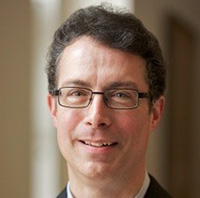 Mark Williams
Mark WilliamsGoals. As a historian of film and media I am indebted to the work of the AMIA membership. Attending my first AMIA conference in 2008 literally changed the course of my scholarship and teaching, leading to the founding of The Media Ecology Project (MEP) at Dartmouth. We in AMIA know that our treasured archival materials are fated and endangered except for the dedicated work of archivists. Academia must play a more productive role in support of these essential goals. The basic aim of MEP is to create a virtuous cycle of new scholarship that grows the field of media studies but also adds value back to our participating archives and media collections. We support “traditional” scholarship (however this might be defined) but also 21st century methods that engage computational tools to realize innovative directions for research. I am proud to have established strong working relationships with major national archives but also local and regional archives in the U.S. Our AMIA colleagues have guided and enabled our distinctive brand and reputation in the world of academia. I am currently working to create new collaborations with international archives and scholars. I hope to lend a strong profile to the significance of international collaboration across the archival and scholarly worlds. Especially within the decidedly “presentist” emphasis found in our digital attention economy, the significance of historical media and insightful literacy about this history has never been more important. It would be an honor to represent these values as a member of the AMIA Board.
Relevant Experience. Multiple presentations at AMIA conferences since 2008, current member of the Editorial Board of The Moving Image, Associate Professor of Film and Media Studies at Dartmouth College, multiple presentations at Orphans Symposium, Director of The Media Ecology Project
 Ashley Franks-McGill
Ashley Franks-McGillGoals. Getting involved in the AMIA community has been an essential part of my personal and professional growth. As a member of the AMIA board my goal is to continue to provide support and promote AMIA’s wide range of education and advocacy programs and initiatives such as Pathways and Mentorship. I believe that everyone has something to offer and you don’t need to be at any particular stage of your career to consider becoming a mentor. AMIA’s Mentorship Program offers a unique structure with the role of the mentor advisor supporting both mentees and mentors in their mentorship journey. One of the amazing things about this community is getting involved in programs and initiatives – or even having a vision for one and building it. Being able to create and launch AMIA’s Mentorship Program has been the highlight of my professional career. As a member of the AMIA board I will continue to inspire others to step up and get involved, as my incredible colleagues have done for me. I will seek to secure funding to sustain the AMIA Mentorship Program as it continues to expand and have a profound impact on shaping the lives and careers of professionals in our field. I will continue outreach to potential new mentors in our community by engaging, encouraging and empowering future leaders in our field through mentorship and leadership development. I will also continue to develop and promote our unique model for AMIA’s Mentorship Program through knowledge and resource sharing with interested partners.
Relevant Experience. As Film Services Manager at Duplitech, I oversee our film remastering workflow including shipping/receiving, film inspection and scanning, conform, digital restoration and color correction. My introduction to the field was through an internship at Oddball Films where I received hands-on training in film preservation and access, while also studying Collections Management in the dual degree Museum Studies/Business Administration program at John F. Kennedy University. I previously held positions as a film scanning volunteer at the Internet Archive for 2 years, Media Archivist at Multicom Entertainment Group and have been at Duplitech for over 3 years beginning as a Film Archivist. Since becoming an AMIA member and attending my first conference in 2017, I have created and directed AMIA’s Mentorship Program. I have also held leadership positions including member of the Pathways Fellowship Pilot Program, Co-Chair of the AMIA Education Committee and Chair of the AMIA Scholarship Subcommittee.
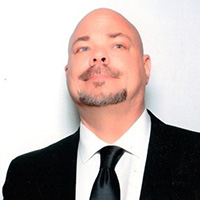
Goals. I would like your vote to continue to serve as our Treasurer shepherding AMIA’s finances for the next two years. I am very proud of our ongoing work to keep our Association fiscally sound. It has been my honor to serve the Board. As Treasurer, I will continue to ensure AMIA remains financially sustainable and independent, continue to provide the Board with the best financial information I can, and continue to support fiscally responsible decision making. I believe AMIA can be both financially healthy and provide affordable opportunities to our membership.
Relevant Experience. I joined AMIA as a grad student. Since then, I have served as chair of the Cataloging & Metadata Committee, the LGBT Committee, the Conference Committee, and the Moving Image Related Materials & Documentation Committee. I have presented papers at AMIA events, Henry Stewart, MESA, etc., and I have published papers on asset management, digital authenticity, and moving image taxonomy & ontology administration. I have served on the Board as both Secretary and Treasurer. I am currently a Director of Warner Bros. Discovery Archives, and in the past, I have been the Director of HBO Archives, a Digital Archivist and Sr. Director of Metadata & Media Services at Turner Broadcasting, and a Manager of Archives at DreamWorks. I hold a BFA in film and video production, with an MLIS specializing in archive administration, both from the University of Wisconsin.